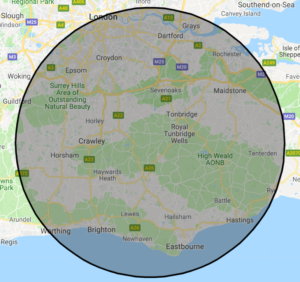In October, I decided to tell an anecdote about sharpening one’s axe as a way of ensuring that your business maintains its optimum potential. This month, I am sharing another anecdote. Whereas last month’s was inspired by US President Abraham Lincoln, this story has much humbler origins. This is a personal anecdote that I like to tell my clients, but one that is 100% true; I witnessed the events unfold myself. It highlights the importance of inclusiveness within your business, and importantly, not letting the little things slip under your radar as a business owner.
The story
A while ago (a long while), I was working in a company that designed and assembled industrial power controllers; they operated at high temperatures so were fitted with large heatsinks, essentially aluminium extrusions with metal fins to dissipate the heat and protect the devices. To maximise the cooling effect the heatsinks were painted black.
The factory was ticking along fine until one day a product failed its quality check. Soon after, another one followed suit, and another, and another, until it got to the point where a large percentage of the products were failing the electrical tests carried out by the quality control team.
The factory was in disarray, with management banging their heads together trying to figure out what was going wrong in the production line! The quality of the materials was being put into question, the workers were doubting their own abilities and, more importantly, the unsellable products that were being produced were starting to have dire consequences on the firm’s profitability; not surprisingly, morale was going downhill. If something was not done soon, then the future of the firm could be put into question.
In the company, there was an older man, whose job it was to clean up and do general tidying around the floor, who muttered as he swept: ‘I know what’s wrong!’ But his claims fell on deaf ears; no-one listened to him, because he was the cleaner/odd-job man.
This went on for a while, with the more and more products failing and the cleaner saying louder and louder: ‘I know what’s wrong!’ Nobody listened to him, until finally, one day, losing all hope, the bosses asked him what he thought was the problem: the man told his supervisors that that there was contamination in the tank containing the black paint in which the devices were dipped. The tank was never cleaned; as the paint was used new paint was poured on top of the old and over the years contamination built up in the tank. The tank was cleaned out, fresh paint was poured in – and the cleaner was right: it was all that was needed to solve the problem and restart production.
The moral of the story is that everyone in your business brings value, and probably some innovative, good ideas. The factory’s production line was in crisis, and it was the cleaner who provided the solution – had he been listened to earlier, a lot of problems could have been avoided.
We can all learn from each other

As a business owner, you probably know the most about the ins-and-outs of your business – and rightfully so. This doesn’t mean however that we have nothing to learn from our employees – far from it: everyone in your business brings value, and their value may extend beyond their job description.
The example I like to enlist here is that of Socrates, Plato and Aristotle. Socrates (470-399) had a profound effect on philosophy, which is still widely respected today. But it’s his favoured student, Plato, who is more widely renowned today. Socrates never actually wrote down any of his theories; it was Plato who helped to communicate them to the outside world. Plato was, in many senses, Socrates’ inferior, and after his death spent a lot of time in depression; despite this, the two could not have had as great an impact on the philosophical world in isolation. Socrates needed his student, who would manage to carry on and systemise his legacy, and Plato needed Socrates for inspiration for many of his revolutionary ideas.
The cycle of knowledge does not stop there, however, as Aristotle – Plato’s prize student – once again went on arguably to outshine his predecessor. Once again, however, neither could have achieved the success they did, without the help of the other. In many senses, Socrates, Plato and Aristotle are a textbook example of the famous phrase: ‘The pupil has become the master’, and yet it is not that simple. Without their teachers, the budding philosophers would have been nothing;in return, each managed to carry on their teacher’s legacy. This ancient example highlights once more the importance of listening and embracing the ideas of everyone within your business to maximise your successes.
So, what should I do?
The best thing we, as business owners, can do to avoid a situation where the cleaner has to save our business, is by including the cleaner in the first place. Here are just a few ways to do just that:
Mix up the environment – leave your desk for a while, visit different parts of your team; you’ll gain great perspective from doing so and interacting with people you might not otherwise.
Hot seating – this technique focuses on not having any permanent positions at desks in the office. Working on a first-come, first-serve basis will help to get your employees interacting with people outside of their department and sharing ideas.
Switch up meetings – just because you’re the boss, doesn’t mean you need to take centre stage at every meeting. Let different people within the business take the limelight for a while to keep ideas fresh and creative. Meetings need to be focused and ideally short. In one of my future blogs I will show you a great meeting structure, known as the ‘LION’ meeting – Simple, short and effective.
Formulate an inclusion panel – this will only apply if your business is big enough. The panel can discuss making sure everyone’s ideas are heard within the business.
The sum is often bigger than the parts; creating an open culture in which everyone can add value is likely to boost your business’s success.
My clients benefit from a whole range of supporting materials to help them in all areas of their business*.
If you’d like to know more about the business areas in which I can help you, call 01732 453 464.
Value Builder exclusive offer
Value Builder is an extraordinarily powerful tool to give business owners the insights they need to meet their business and personal goals, so I am personally committed to making it available to entrepreneurs in Kent, Sussex and Surrey, in the area indicated in the map.
Value Builder normally costs business owners £500. However, I am delighted to offer it to selected businesses free of charge – and I am also pleased to offer the follow up 90-minute 121 consultation to go through your results at my expense.
Why? Well, I want businesses to have the very best chance to grow and develop, delivering the results business owners and their families deserve.
Secondly, I want to see businesses thrive and recruit additional team members to further grow the business and help to boost the local economy.
The full list of towns where I can provide this service is below, but if you don’t see your location, give me a call or drop me an email I will let you know if I can help you. If I can’t, I’ll put you in touch with one of my colleagues who helps businesses in your area.
To apply for your FREE Value Builder report and business strategy review
Call 01732 453 464
Or email julianweekes@actioncoach.com
I help business owners in the following towns:
Brighton & Hove |
Hailsham |
Lingfield |
Seaford |
Bromley |
Hastings |
Maidstone |
Sevenoaks |
Cranbrook |
Haywards Heath |
Newhaven |
Sittingbourne |
Crawley |
Heathfield |
Orpington |
Tenterden |
Crowborough |
Hildenborough |
Oxted |
Tonbridge |
Dorking |
Horam |
Paddock Wood |
Tunbridge Wells |
Eastbourne |
Horley |
Redhill |
Uckfield |
East Grinstead |
Horsham |
Robertsbridge |
Wadhurst |
Edenbridge |
Kings Hill |
Rotherfield |
Worthing |
Goudhurst |
Lewes |
Rye |
Don’t see your location in the list? Drop me a line and I’ll let you know if I can help you – or put you in touch with one who my colleagues who works with business owners in your area.
*My clients benefit from supporting material and coaching in the following business areas:
Sales & marketing |
Lead generation |
Sales process |
Business planning |
Time management |
Finance, understanding the numbers |
USP & POD (Unique Selling Point and Points Of Difference) |
Systems |
Team / Team dynamics |
Recruitment / DISC / personality profiling |
Leadership |
Business growth |
Strategies for profit |
Succession planning |
Exit strategies |
Looking for support in one of these key business areas?
Call 01732 453 464
Or email julianweekes@actioncoach.com







